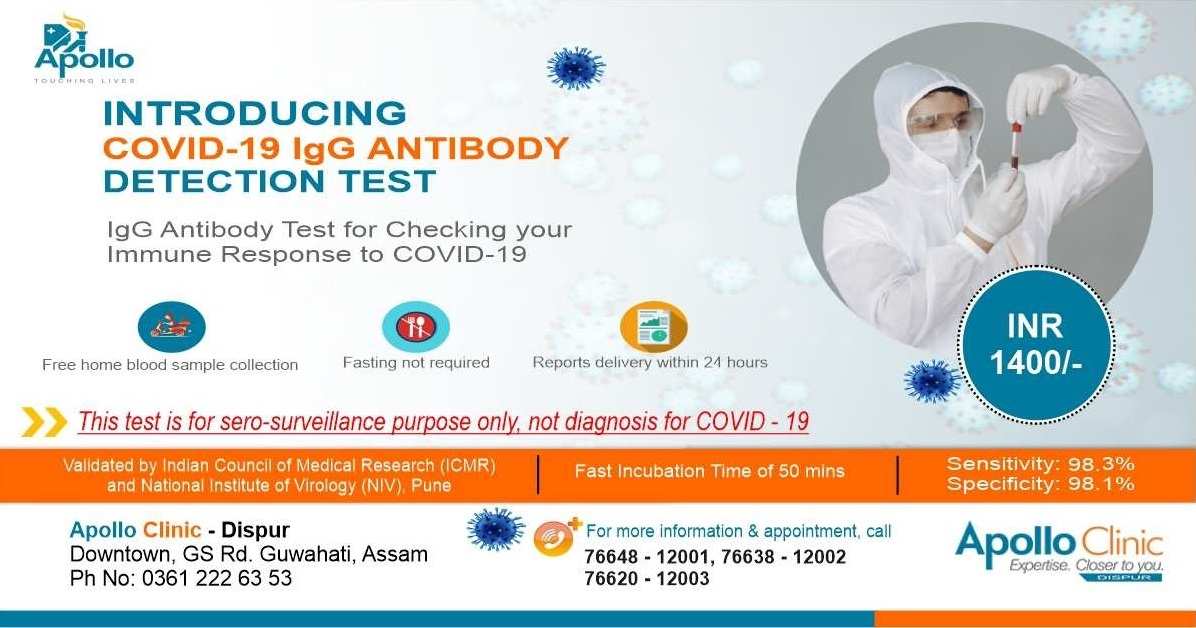
What is IgG Antibody Test
Currently, there are two types of tests for SARS-CoV-2, which provide different kinds of information.
Diagnostic tests detect if someone is currently infected, and
Antibody tests, also known as serology tests, detect if an individual was infected in the past and has an immune response.
Serology testing does not detect the presence of the virus, but rather detects the antibodies that are, or was, produced by the body in fighting the disease.
Antibodies are proteins produced by the immune system in response to an infection and are specific to that particular infection. They are found in the liquid part of the blood called serum or plasma.
Immunoglobulin M or IgM is the first type of antibody produced in response to an infection and is detectable from 4 to 7 days after infection starts. IgM antibodies are short-lived and their existence signals a new infection is present.
Immunoglobulin G or IgG antibodies are produced 7 to 14 days after infection and these antibodies can be detectable for weeks, months, and even years, depending upon the antigen and the individual.
IgG antibodies are usually sustained for a longer time and may play a role in lasting immunity. However, since we don’t know a lot about SARS-CoV-2, as it’s a new virus, we don’t know how immunity against this virus works.
A combined IgG-IgM test cannot distinguish between early (IgM) and late (IgG antibody responses. As a result, total assays can’t reveal whether a person has the IgG antibodies that are needed for longer-term immunity, or if they are currently infected.
For clinicians, knowing whether an individual has developed SARS-CoV-2 specific IgG antibodies could be critical to determining immunity. An IgG specific serology tests reveal if someone had COVID-19 in the past and as a result has developed antibodies that are specific to this virus.
The right type of serology test could help understand immunity against COVID-19 at an individual and population level. This can be a key tool to help us develop plans to reopen our society.
CLINICAL SIGNIFICANCE
The Anti-SARS-CoV-2 IgG test is intended to use aid in identifying individuals with an adaptive immune response to SARS-CoV-2, indicating prior infection. The Anti-SARS-CoV-2 IgG test is not for the diagnosis of acute SARS-CoV-2 infection. The test if for the detection of anti-SARS-CoV-2 antibodies. IgG antibodies to SARS-CoV-2 are generally detectable in the blood several days after initial infection, although the duration of detectable antibodies present in the post-infection period is not well documented.
ACCORDING TO ICMR ADVISORY DATED 23-JUNE 2020
IgG antibodies generally start appearing after two weeks of the onset of infection, once the individual has recovered after infection and last for several months. Therefore, the IgG test is not useful for detecting acute infection. However, the detection of IgG antibodies for SARS-CoV-2 may be useful in the following situations:
- Serosurveys to understand the proportion of the population exposed to infection with SARS-CoV-2 including asymptomatic individuals. Depending upon the level of seroprevalence of infection, appropriate public health interventions can be planned and implemented for prevention and control of the disease. Periodic serosurveys are useful to guide the policymakers.
- A survey in high risk or vulnerable populations (healthcare workers, frontline workers, immune-compromised individuals in containment zones, etc.) to know who has been infected in the past and has now recovered.
A Non-Reactive test result means that the IgG antibodies to the virus that causes COVID-19 were not found in your sample. However, it is possible for this test to give a false Non-Reactive result occasionally in some people with COVID-19 infection.
A Non-Reactive result may occur in the early period of acute illness as your body hasn’t had time to produce IgG antibodies to the infection. Your doctor will consider the test result together with other aspects of your medical history (such as symptoms, possible exposures, and geographical location of places you have recently travelled) in deciding how to care for you.
It is important that you work with your doctor/healthcare provider to help you understand the next steps you should take.
A Reactive test result indicates that IgG antibodies to SARS-Cov-2 were detected in your blood and you are likely to have or previously been infected by the COVID-19 virus and that you have developed an antibody response to the virus.
The referring doctor/healthcare provider will work with you to determine how best to care for your health based on the test results along with other relevant factors of your medical history.
